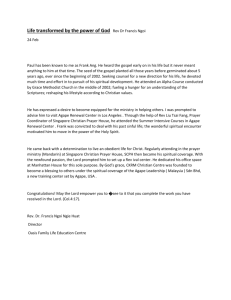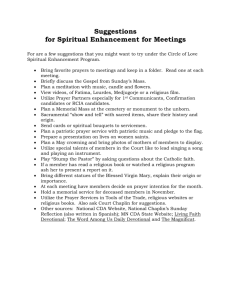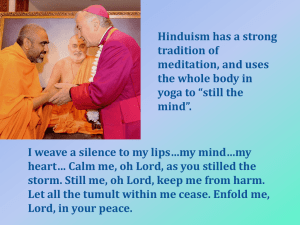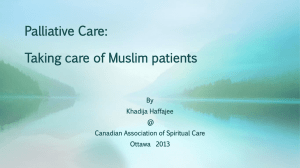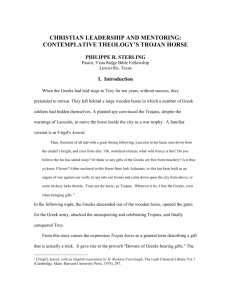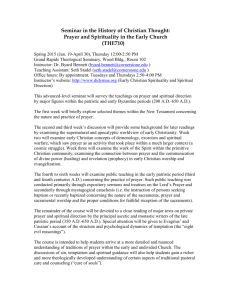See Judge Act process
advertisement
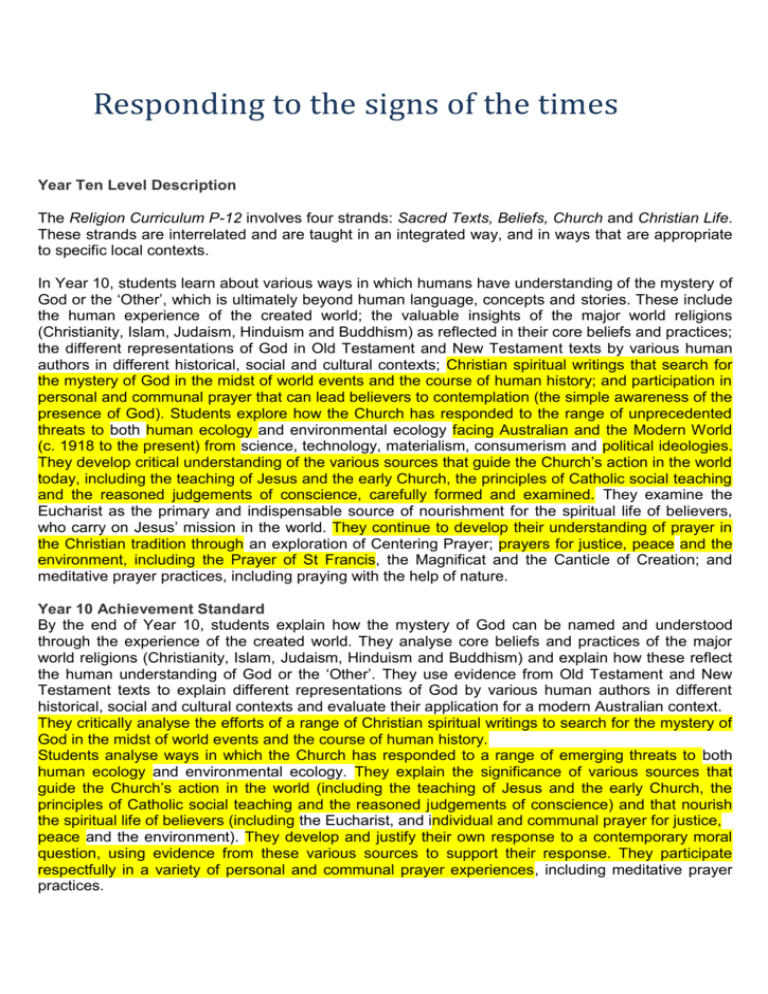
Responding to the signs of the times Year Ten Level Description The Religion Curriculum P-12 involves four strands: Sacred Texts, Beliefs, Church and Christian Life. These strands are interrelated and are taught in an integrated way, and in ways that are appropriate to specific local contexts. In Year 10, students learn about various ways in which humans have understanding of the mystery of God or the ‘Other’, which is ultimately beyond human language, concepts and stories. These include the human experience of the created world; the valuable insights of the major world religions (Christianity, Islam, Judaism, Hinduism and Buddhism) as reflected in their core beliefs and practices; the different representations of God in Old Testament and New Testament texts by various human authors in different historical, social and cultural contexts; Christian spiritual writings that search for the mystery of God in the midst of world events and the course of human history; and participation in personal and communal prayer that can lead believers to contemplation (the simple awareness of the presence of God). Students explore how the Church has responded to the range of unprecedented threats to both human ecology and environmental ecology facing Australian and the Modern World (c. 1918 to the present) from science, technology, materialism, consumerism and political ideologies. They develop critical understanding of the various sources that guide the Church’s action in the world today, including the teaching of Jesus and the early Church, the principles of Catholic social teaching and the reasoned judgements of conscience, carefully formed and examined. They examine the Eucharist as the primary and indispensable source of nourishment for the spiritual life of believers, who carry on Jesus’ mission in the world. They continue to develop their understanding of prayer in the Christian tradition through an exploration of Centering Prayer; prayers for justice, peace and the environment, including the Prayer of St Francis, the Magnificat and the Canticle of Creation; and meditative prayer practices, including praying with the help of nature. Year 10 Achievement Standard By the end of Year 10, students explain how the mystery of God can be named and understood through the experience of the created world. They analyse core beliefs and practices of the major world religions (Christianity, Islam, Judaism, Hinduism and Buddhism) and explain how these reflect the human understanding of God or the ‘Other’. They use evidence from Old Testament and New Testament texts to explain different representations of God by various human authors in different historical, social and cultural contexts and evaluate their application for a modern Australian context. They critically analyse the efforts of a range of Christian spiritual writings to search for the mystery of God in the midst of world events and the course of human history. Students analyse ways in which the Church has responded to a range of emerging threats to both human ecology and environmental ecology. They explain the significance of various sources that guide the Church’s action in the world (including the teaching of Jesus and the early Church, the principles of Catholic social teaching and the reasoned judgements of conscience) and that nourish the spiritual life of believers (including the Eucharist, and individual and communal prayer for justice, peace and the environment). They develop and justify their own response to a contemporary moral question, using evidence from these various sources to support their response. They participate respectfully in a variety of personal and communal prayer experiences, including meditative prayer practices. Learning Intentions In this series of learning experiences students: explore how the Christian churches and others have responded to a range of threats to humanity facing Australia and the Modern World (c. 1918 to the present) especially the events of the Shoah (Holocaust) develop critical understanding of the various sources that guide the Church’s action in the world today, including the teachings of Jesus and the early Church, the principles of Catholic social teaching and the reasoned judgements of conscience, carefully formed and examined. critically analyse a range of Christian spiritual writings that reflect the search for the mystery of God in the midst of world events participate respectfully in prayers for justice and peace Success Criteria Students use the teachings of Jesus, the principles of Catholic Social Teaching and the reasoned judgements of conscience to respond to the actions and events of the Shoah (Holocaust) Students critically analyse Christian spiritual writings that attempt to make sense of the mystery of God in the midst of the Shoah (Holocaust). Students develop and justify their own response to a contemporary moral question, using evidence from various sources to support their response. Students demonstrate their understanding of the ways in which prayer nurtures the spiritual life of believers by developing and participating respectfully in prayers for justice and peace
